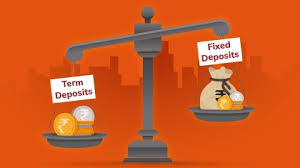Fixed Deposit vs. Term Deposit: Are They the Same or Different?
When it comes to investing your hard-earned money, fixed deposits (FDs) and term deposits often come to mind. Many people use these terms interchangeably, but are they really the same? Both are secure investment options. Still, there are some key comparisons of “fixed deposit vs term deposit”. In this article, we’ll explore the distinctions between FDs and term deposits. This helps you make an informed decision for your financial future.
Understanding Fixed Deposits
Get high ROI with 8.8% on Fixed Deposits. Invest today
What is a Fixed Deposit?
A fixed deposit is a type of investment. In this, you deposit a lump sum for a predetermined period at a fixed interest rate. The tenure can range from a few days to several years, depending on your preference. Banks, non-banking financial companies (NBFCs), and post offices offer FDs.
Benefits of Fixed Deposits
- Guaranteed Returns: FDs provide assured returns as the interest rate remains fixed throughout the tenure.
- Flexibility: You can choose the tenure that suits your financial goals, from short-term to long-term investments.
- Safety: Fixed deposits are considered one of the safest investment options, as they are not affected by market fluctuations.
Calculating Fixed Deposit Returns
To calculate your FD returns, you can use the following formula:
A = P (1 + r/n)^(n*t)
where
A = Maturity amount
P = Principal amount
r = Annual interest rate
n = Number of compounding periods per year
t = Tenure of the FD in years
For example, if you invest ₹1 lakh in an FD with an annual interest rate of 6% for 3 years, compounded quarterly, your maturity amount would be:
A = 100,000 (1 + 0.06/4)^(4*3) = ₹1,19,407
Exploring Term Deposits
What is a Term Deposit?
A term deposit is also known as a time deposit. It is an investment instrument where you deposit money for a fixed tenure at a predetermined interest rate. The maturity period typically ranges from a few weeks to a few years. Like FDs, term deposits are offered by banks, NBFCs, and post offices.
Characteristics of Term Deposits
- Guaranteed Returns: The interest rate remains fixed throughout the tenure, ensuring guaranteed returns.
- Minimum Deposit Amount: Most financial institutions have a minimum deposit requirement for term deposits.
- Fixed Tenure: Term deposits have a specified tenure, and you cannot withdraw the funds before maturity without incurring a penalty.
Term Deposit Interest Rates
The interest rates for term deposits vary depending on the financial institution and the tenure of the deposit. Generally, longer tenures offer higher interest rates compared to shorter ones. You can compare the interest rates of different term deposits using the Airtel Finance Fixed Deposit Interest Rates page.
Fixed Deposit vs Term Deposit: Key Differences
Tenure Flexibility
One difference between FD and term deposits lies in their tenure flexibility. Term deposits typically offer more flexible tenure options, ranging from a few weeks to a few years. This makes them suitable for short-term financial goals or if you anticipate needing the funds in the near future.
Simultaneously, fixed deposits have longer tenure options, usually starting from a few months and extending up to several years. FDs are ideal for medium to long-term financial goals, such as saving for your child’s education or planning for retirement.
Interest Rates
While both FDs and term deposits offer fixed interest rates, there can be slight variations. Fixed deposits generally provide marginally higher interest rates, especially for longer tenures. For instance, a 1-year FD might offer a 6.5% interest rate, while a 1-year term deposit could offer 6%.
It’s essential to compare the interest rates offered by different financial institutions before investing. You can use the Airtel Finance Fixed Deposit Interest Calculator to estimate your returns.
Premature Withdrawal
Both fixed deposits and term deposits allow premature withdrawal but with certain conditions. If you withdraw your funds before the maturity date, you may have to pay a penalty. It can vary across financial institutions. Some banks may also offer a lower interest rate for premature withdrawals.
However, some financial institutions provide the facility of a loan against your fixed deposit or term deposit. This allows you to access funds without breaking your deposit and losing out on interest earnings.
Choosing Between Fixed Deposit and Term Deposit
When making a comparison of time deposit vs fixed deposit, consider your financial goals, investment horizon, and liquidity requirements. If you have a long-term investment perspective and don’t need immediate access to funds, FD could be a suitable choice. They offer slightly higher interest rates and are ideal for building a secure financial future.
If you have short-term financial goals or want more flexibility regarding tenure, term deposits might be a better fit. They provide the opportunity to invest for shorter durations and can be a good option for parking your surplus funds.
The answer to this question, “is term deposit and fixed deposit same?” is here. Fixed deposits and term deposits are both secure investment options that offer guaranteed returns. While they share similarities, there are notable differences in terms of tenure flexibility, interest rates, and premature withdrawal facilities. By understanding these distinctions, you can make an informed decision based on your financial goals and requirements.
Remember, before investing in any fixed deposit or term deposit, it’s crucial to compare the interest rates. Further, check the required documents and read the terms and conditions carefully. Airtel Finance offers a range of fixed deposit options with competitive interest rates and a seamless online application process. Visit the Airtel Finance Fixed Deposit page to explore your investment opportunities and take a step towards securing your future.
FAQs:
1. Are interest rates for Fixed Deposits and Term Deposits the same?
Interest rates for fixed deposits and term deposits can vary slightly. Fixed deposits often offer marginally higher rates, especially for longer tenures.
2. What is the difference between a Fixed Deposit and a Term Deposit?
Fixed deposits generally have longer tenure options and slightly higher interest rates. Meanwhile, term deposits offer more flexibility in terms of shorter tenures.
3. Can you withdraw money prematurely from a Term Deposit or Fixed Deposit?
Yes, both term deposits and fixed deposits allow premature withdrawal. But, a penalty may be applicable, and the interest rate could be lower for the withdrawn amount.
4. Do Fixed Deposits and Term Deposits have similar tax treatments?
Yes, the interest earned on both fixed deposits and term deposits is taxable as per your income tax slab rate. TDS may be deducted if the interest earned exceeds a certain threshold.
5. Which is more popular: Fixed Deposits or Term Deposits?
Fixed deposits are generally more popular among investors due to their longer tenure options and higher interest rates. This makes them suitable for medium to long-term financial goals.



